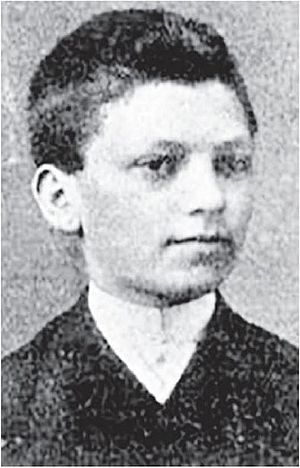Jean-Baptiste Sipido facts for kids
Jean-Baptiste Victor Sipido (born December 20, 1884 – died August 20, 1959) was a young Belgian man who became well-known for a surprising event. When he was just 15 years old, he tried to harm the Prince of Wales (who later became King Edward VII) at the Brussels-North railway station in Brussels, Belgium, on April 5, 1900. At the time, Jean-Baptiste was working as a tinsmith's apprentice.
Contents
Who Was Jean-Baptiste Sipido?
Jean-Baptiste Sipido was a teenager from Belgium. He held strong beliefs, sometimes called anarchist views, meaning he believed that governments should have very little power, or no power at all. He felt very strongly about fairness and justice in the world.
The Attempt on the Prince
Why Did He Do It?
Jean-Baptiste Sipido believed that the Prince of Wales was responsible for many deaths during the Second Boer War in South Africa. This war was a conflict between the British Empire and two independent Boer states. Sipido felt very angry about the war and the suffering it caused. He wanted to make a statement against it.
What Happened at the Station?
On April 5, 1900, the Prince of Wales was about to leave Brussels by train. Just as the train was moving, Jean-Baptiste Sipido quickly jumped onto the footboard of the royal train car. He then fired two shots through the window. Luckily, he missed everyone inside the compartment. He was quickly stopped and held down by people nearby.
The Surprising Trial Outcome
Why Was He Found Not Guilty?
Even though it was clear that Sipido had tried to shoot the Prince, his trial had a very unusual result: he was found not guilty. The main reason for this was his age. He was less than 16 years old at the time of the event. The jury decided that because he was so young, he didn't fully understand the seriousness of his actions. They believed he was not "legally responsible" for what he did. The court did not even send him to a special school for young offenders.
What Happened After the Trial?
Right after the trial, Jean-Baptiste Sipido immediately left Belgium and went to France. The decision to find him not guilty caused a lot of anger in Britain. Arthur Balfour, a very important leader in the British government, said it was a "grave and most unfortunate miscarriage of justice." This meant he felt that justice had not been served at all.
Life After the Event
After this dramatic event, Jean-Baptiste Sipido lived a long life. He eventually worked as a technical and commercial director for a large organization in Belgium called the General Society of Belgian Socialist Cooperatives. This organization was involved in helping workers and communities. Later in his life, he retired and moved to a town called Cagnes in France, where he lived until he passed away in 1959.
 | Sharif Bey |
 | Hale Woodruff |
 | Richmond Barthé |
 | Purvis Young |


